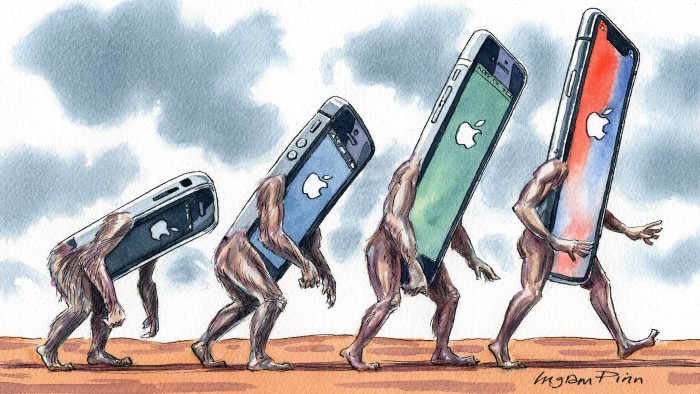Opinion today: Apple is still growing up


This article is from today’s FT Opinion email. Sign up to receive a daily digest of the big issues straight to your inbox.
Don’t be fooled by the numbers. Despite flat sales of smartphones this year and last, Apple is still on the ascendant, writes John Gapper. Smartphones took just a decade to reach their current peak — a period of rapid adoption as we all fell in love with our handheld devices. But it is the next period we should take notice of: the era of widespread adoption, when dominance is really established.
This is where Apple finds itself now. Enough people own its products and are spending increasing amounts of time with them (an average of 3.3 hours a day in America) that company executives can afford to introduce new features intended to help us curb our addictions. That is a comfortable problem to have. And it is evidence, as John argues, of the adage that we tend to overestimate the effects of any technology in the short run but underestimate them in the long run.
Money for old bones
Anjana Ahuja writes about the unlikely, yet spectacularly profitable, trade in dinosaur fossils. Enthusiasts from Leonardo DiCaprio to Russell Crowe are collectors, but should humanity’s heritage be allowed in private hands at all?
Losing the west
Ed Luce wonders at US president Donald Trump’s unthinkable achievement: uniting America’s allies against the US and empowering its enemies.
Trouble on the Nile
David Pilling explains how the clique that has ruled Ethiopia for nearly 30 years, with some success and much repression, is at risk of implosion.
Rail renewal
Jude Webber on how Mexico’s plans for a (potentially Chinese-funded) railway line connecting the Atlantic and Pacific could exacerbate tensions with the US.
What you’ve been saying
Central banks can lead in disclosure of climate risks — letter from New Economics Foundation, Greenpeace and others:
It seems sensible that central banks take the lead in transparently reporting climate-related financial disclosures. Such action is further warranted in view of the number of central banks that have taken an interventionist role in the economy, building up portfolios of government and corporate securities via quantitative easing. Evidence from the UK and eurozone suggests that these portfolios are highly skewed towards carbon intensive sectors.
Comment from MLC on Why the Swiss should vote for ‘Vollgeld’:
Surely this is a nonsense solution to the ‘too big to fail’ problem. It means more rules and regulations. How will banks be stopped from lending/creating promises of money as they do now? The potential politicisation of money supply seems unnecessary and dangerous.
Free and easy trade rubs up against physical reality — letter from Charles Lucas:
My fear is that whatever the elegance of the scheme the UK devises as it struggles with the complexities of the post-Brexit border with the EU (May 5), the actuality of customs inspections has not changed much and the free and easy trade with Europe that is necessary for our (and their) prosperity is more than a little threatened.
Today’s opinion
FT Magazine: Does digital technology help us appreciate art?
Gillian Tett dons a headset at the Metropolitan Museum of Art’s new Versailles exhibition
The trade in dinosaur fossils robs humanity of its heritage
Wealthy collectors’ desire for old bones risks getting in scientists’ way
Mexican ‘Silk Road’ trade corridor is set to spice up US tension China is in the frame to fund a cross-isthmus railway under its Belt and Road Initiative
A last-ditch gamble for Ethiopia’s ‘miracle on the Nile’
Prime minister Abiy Ahmed is trying to resolve the country’s contradictions
EM Squared: Chinese insurance market to buoy global assets
Industry growth expected to provide long-term support for equity and bond markets
Free Lunch: Rome must make its own room for manoeuvre
Italy’s new government should pre-emptively stretch out its debt repayments
The iPhone is only just starting to grow up
Flat sales of smartphones mask a third industrial revolution yet to reach its peak
The battle for liberal democracy will be waged in cities
Urban areas have become the main arenas in which our governance is decided
How Donald Trump is empowering China
In uniting America’s allies against it, the president has done the unthinkable
FT View
FT View: Multilateralism without American leadership
The other G7 nations must do what they can to preserve co-operation
FT View: The UK is right to sell down final stake in RBS
The bailout was not aimed at profit, and the future is uncertain
The Big Read
The Big Read: How millennials became the world’s most powerful consumers
They are the biggest global generation — and their choices are upending business from the US to China
Comments